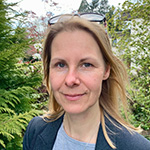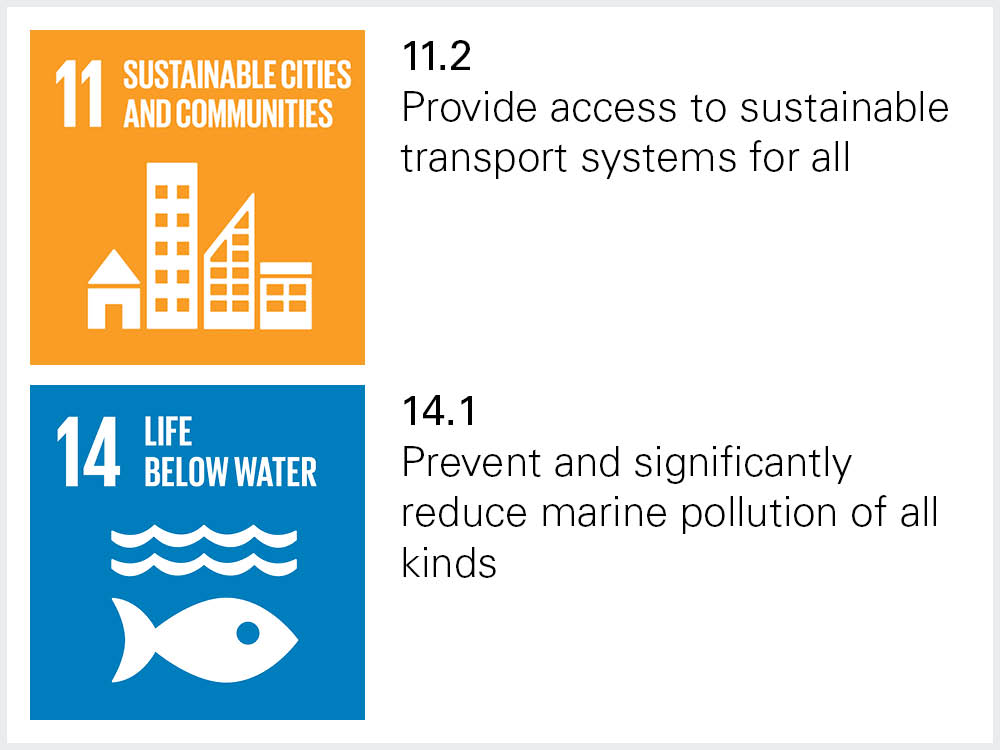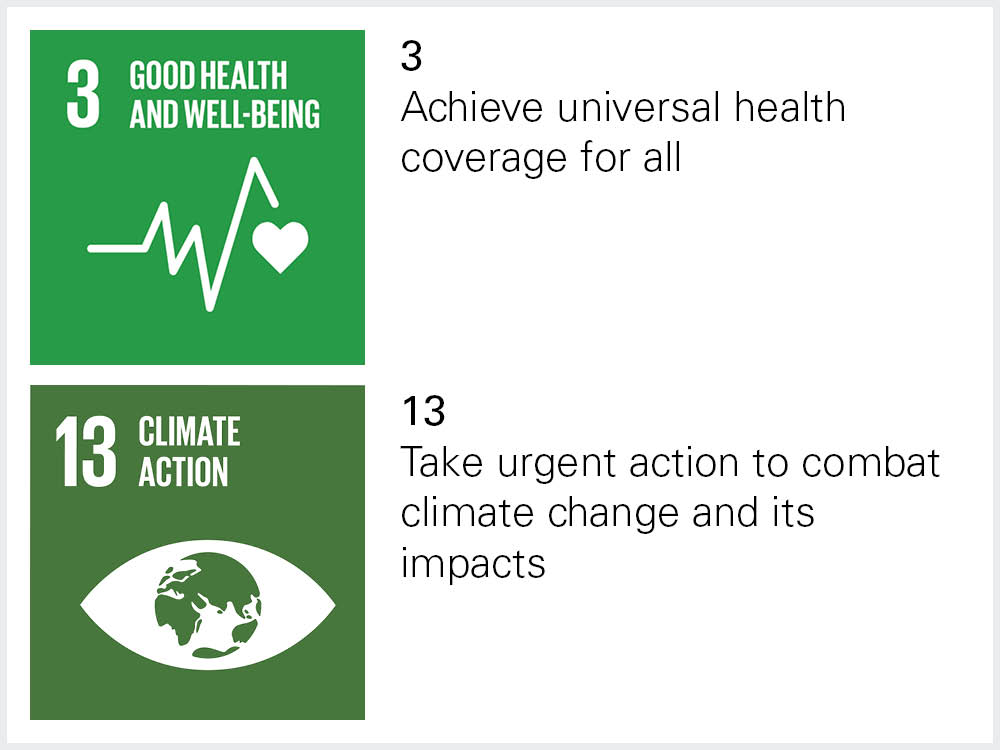Research

In 2021 and 2022, high-quality research on sustainability was once again carried out in a variety of disciplines at the University of Basel. This is seen particularly in the numerous publications on a wide variety of research topics relating to sustainability. One important new development is the formation of the research network “Sustainable Future”, which is playing an important role in further strengthening interdisciplinary research at the University of Basel.
Research network "Sustainable Future"
The research network “Sustainable Future” was established in 2021. It currently brings together 101 researchers from five faculties with the goal of strengthening interdisciplinary sustainability research at the University of Basel. Numerous studies have already been published in its three thematic focal areas: Energy and Climate, GeoBio-Diversity and Sustainable Digital Work.

Societal transformations toward sustainability are complex and dynamic, without predefined boundaries or results, and therefore require cutting-edge, inter- and transdisciplinary research.
Dr. Iljana Schubert, Sustainability Research Group, member of the research network Sustainable Future
In the area of energy and climate, Dr. Basil Bornemann, Dr. Marius Christen and Prof. Aya Kachi examined the implementation of the international sustainability targets in Swiss cantons. Prof. Paul Burger and Dr. Iljana Schubert led an interdisciplinary study on modeling methods with the aim of supporting decision makers in designing sustainability measures in the area of mobility. In cooperation with ETH Zurich, Prof. Beat Hintermann and his “Public Economics” research group used GPS data to examine how the Swiss population’s mobility behaviors changed during the first phase of the COVID-19 pandemic. Among other findings, their research showed that distances traveled were significantly reduced and there was an increase in travel by bicycle.
In the environmental sciences, Prof. Patricia Holm’s research team published two studies on microplastics in Antarctica. On the one hand the studies showed that ship traffic is an important source of microplastics in Antarctica, and on the other hand that the emperor penguins there are not yet ingesting any microplastics through their food. Prof. Ruth Delzeit established the new “Global & Regional Land Use Changes” research group, which deals with land as a resource and the conflicts connected with it, for example in relation to the growing global population.
CoSi consortium receives funding from the SWEET energy research program
In 2022, the University of Basel applied to the Swiss Federal Office of Energy’s SWEET energy research program and received funding connected to the program in January 2023. The SWEET (“Swiss Energy Research for the Energy Transition”) funding program is intended to continue advancing research into the energy transition in Switzerland. Hannes Weigt, Professor of Energy Economics, will use the funds from SWEET to direct the CoSi (“Co-Evolution and Coordinated Simulation of the Swiss Energy System and Swiss Society”) research consortium. Over a dozen universities and research institutions belong to the consortium, which researches interactions between society and energy systems.
Sustainability as a research focus in various disciplines
In the past two years, many excellent studies relating to sustainability have been published in numerous disciplines. Prof. Ben Engel’s research group, which is housed in the Biozentrum and which conducts research on the molecular structure of cells, successfully decoded the structure of a bacterial enzyme that has potential for storing CO2. It is also the first known enzyme to use hydrogen for this purpose and thus shows new ways to use hydrogen as an energy source.
Prof. Markus Gerber’s team from the Department of Sport, Exercise and Health examined the effects of sports and exercise on the mental health and cardiorespiratory fitness of residents of a Greek refugee camp. Under the direction of Prof. Jens Köhrsen, a team from the Center for Religion, Economics and Politics examined the role religion plays in sustainable change in cities. They found that the environmental movement is gaining significance in churches and is increasingly supported with money and staff, but that congregational implementation is nonetheless often a challenge.
Additional research projects on sustainability are introduced in the following image gallery:
Sustainability in everyday research practice - animal ethics
The University of Basel places great value on high ethical and animal-health standards in the use of laboratory animals in basic biological and medical research. The university is a member of the Swiss 3R Competence Centre (3RCCl) and the so called 3R approach (reduction, refinement, replacement) – a foundational principle for ethical research involving animals – is a fixed component of everyday research at the University of Basel. Since 2022, the university has also joined the Swiss Transparency Agreement on Animal Research (STAAR).
Goals & actions
Intensify inter- and transdisciplinary research related to Sustainable Development Goals
Continue and intensify collaboration in the new research network Sustainable Future, develop larger interdisciplinary research projects
Managing Director of the research network Sustainable Future
Promote sustainability in everyday research practices
Support decentralized working groups in the faculties and departments that work for more sustainable practices in their research activities (e.g. green lab projects)
Reduce breeding and husbandry of excess animals that cannot be used in experiments
Sign and implement the Swiss Culture of Care Charter and ongoing funding for the implementation of the 3R approach (replacement, reduction, refinement)
Sustainability Office
Campus Services
Animal Facilities & Animal Welfare
3R Coordination Office
Vice President's Office for Research
3R Coordination Office
Animal Facilities & Animal Welfare
Vice President's Office for Research
Communications & Marketing
Intensify inter- and transdisciplinary research related to Sustainable Development Goals
Organize events and activities to promote interdisciplinary exchange between academics
Grants Office
Sustainability Office
Increase the visibility of research on sustainable development at the University of Basel
Identify research projects that contribute to Sustainable Development Goals (“tagging”) to reveal focus and strengths of sustainability-related research at the University of Basel1
More communication of existing sustainability-related research; providing motivation for joint proposals and research projects
Vice President's Office for Research
Sustainability Office
Grants Office
Sustainability Office
[1] In cooperation with Prof. R. Mata, the "SDG Hackathon" was conducted in 2021 to generate visualizations of the research output. However, a representation of SDG-relevant research of the entire university cannot be presented in a meaningful way due to different data situations and search queries.












